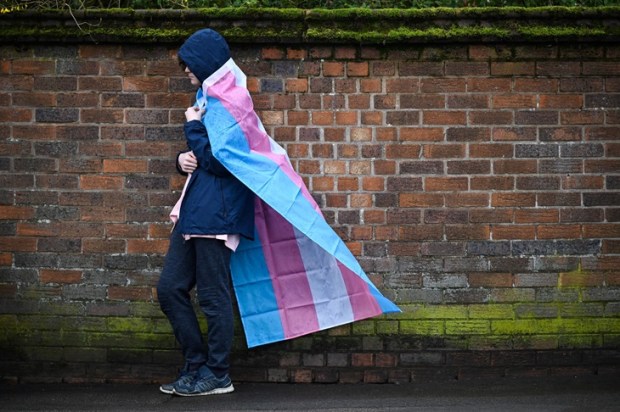We all know by now that society’s Adventures in Wokeland are never-ending. Thankfully, these sagas have become so annoying that their abusive tsunami of evil has caused many ordinary people to wake up and resist.
Examples of Wokeism and reactions to it are legion. Drag queen story time for toddlers has become a common activity, fiercely defended. Note the lengthy and laborious legal battles involving those public figures who have raised objections. It is a nightmare for them, even when they win. More recently, the ABC has advertised at least one drag show in a library for kids aged 3-5. Thankfully, it was cancelled after a huge outcry from a concerned public.
Deflowering the innocence of very young children via these sorts of events is bad, of course, but some would argue it is not as bad as real acts of tyranny and despotism.
Yes… But both are under-girded by ideology.
The Leninist with his rifle and the sexual militants with their costumes are driven by the same ideology: the urge to remake the world in their image – no matter how much it must be razed to the ground along the way.
Ideology is the root, while the usual isms – communism, Nazism, and Wokeism – are all its fruit. We must recall what the great minds have said about this type of ideology. Consider the famous lines of Alexander Solzhenitsyn, from his The Gulag Archipelago:
To do evil a human being must first of all believe that what he’s doing is good, or else that it’s a well-considered act in conformity with natural law. Fortunately, it is in the nature of the human being to seek a justification for his actions.
Macbeth’s self-justifications were feeble – and his conscience devoured him. Yes, even Iago was a little lamb too. The imagination and the spiritual strength of Shakespeare’s evildoers stopped short at a dozen corpses. Because they had no ideology.
Ideology – that is what gives evildoing its long-sought justification and gives the evildoer the necessary steadfastness and determination. That is the social theory that helps to make his acts seem good instead of bad in his own and others’ eyes, so that he won’t hear reproaches and curses but will receive praise and honours.
Thanks to ideology, the 20th Century was fated to experience evildoing on a scale calculated in the millions.
Many others have helped us to see this ideology for what it is. One incredibly inspiring person who long battled the totalitarian temptation, whatever its latest label and current appellation, was the late Sir Roger Scruton (1944-2020). He was fighting Woke totalitarianism well before the term was being used, and he fought it on both sides of the 1989 fall of the Berlin Wall.
Think of his work in Prague in 1979 with members of Charter 77, including Vaclav Havel, and his ongoing work with Eastern European dissidents in the 1980s for example. After the Wall came down, he was still taking on the totalitarians, this time at home.
He discussed all this quite often, including in his 2019 article, Battling the same Thought Police behind the Iron Curtain and in today’s Britain. Many of his books could be appealed to here. Given that I recently revisited his 2006 volume, A Political Philosophy: Arguments for Conservatism, let me offer a few choice quotes to show how fully aware he was of where things were heading in the West – now so heavily submerged in Woke ideology.
Chapter 8 of the book looks closely at ideology, especially the Marxist variety. He asked how Marx and his heirs could so well corral the power of ideology, arguing that Nietzsche’s idea of resentment explains much. He is worth quoting at length:
Totalitarian ideologies are adopted because they rationalise resentment, and also unite the resentful around a common cause. Totalitarian systems arise when the resentful, having seized power, proceed to abolish the institutions that have conferred power on others: institutions like law, property, and religion which create hierarchies, authorities, and privileges, and which enable individuals to assert sovereignty over their own lives. To the resentful these institutions are the cause of inequality and therefore of their own humiliations and failures. In fact, they are the channels through which resentment is drained away. Once institutions of law, property, and religion are destroyed – and their destruction is the normal result of totalitarian government – resentment takes up its place immovably, as the ruling principle of the state.
For the resentful, there is no such thing as authority or legitimate power. There is only pure power, exercised by one person over another, and diagnosed through Lenin’s famous questions: ‘Who? Whom?’ Once in power, therefore, the resentful are inclined to dispense with mediating institutions, and erect a system of pure power relations, in which individual sovereignty is extinguished by central control. They may do this in the name of equality, meaning thereby to dispossess the rich and the privileged. Or they may do it in the name of racial purity, meaning thereby to dispossess the aliens who have stolen their birthright. One thing is certain, however, which is that there will be target groups. Resentment, in the form of it that I am considering, is not directed against specific individuals, in response to specific injuries. It is directed against groups, conceived as collectively offensive and bearing a collective guilt.
In every totalitarian experiment, therefore, you will find that the first act of the centralised power is to single out certain groups for punishment. The Jacobins targeted the aristocracy, later expanded to the ubiquitous ‘emigrés’, whose invisible presence licensed the most arbitrary murders and exterminations. The Nazis singled out the Jews, on account of their material success and because their apartness was both real and hidden. The Russian communists began with the bourgeoisie, but were fortunate in having to hand another and more artificial class of victim: the kulaks, a class created by the state, which could therefore easily be destroyed by the state. One function of the ideology is to tell an elaborate story about the target group, showing it to be less than human, unjustly successful, and intrinsically worthy of punishment. Nothing is more comforting to the resentful than the thought that those who possess what they envy possess it unjustly. In the worldview of the resentful success is not a proof of virtue but, on the contrary, a call to retribution.
That explains why totalitarian ideologies invariably divide human beings into innocent and guilty groups…
All this so nicely describes where we are now with the current plague of Wokeism, progressivism, identity politics, and victimhood narratives. In messianic fashion, these activists and militants have perfected the art of finding recalcitrants and naming and shaming enemies – real or perceived. And as so many of us have long known, it is done with full religious fervour and fashion. Says Scruton:
Now it is my contention that totalitarian ideologies always have that character. They legitimise the resentments of an elite, while recruiting the resentments of those needed to support the elite in its pursuit of hitherto inaccessible advantages. The elite derives its identity from repudiating the old order. And it casts itself in a pastoral role, as leader and teacher of the people. Its theories and visions have the status of revelations, conferring authority on the priestly caste. But they also identify a collective enemy, and in the destruction of this enemy the people can cheerfully join. The elite justifies its seizure of power by referring to its solidarity with those who have been unjustly excluded. Henceforth they will still be excluded, but justly – since they will be excluded in the name of the people, and therefore in the name of themselves.
Whether it is the ubiquitous drag queen story times, the pulling down of statues (as we just again witnessed in Melbourne, or something even darker and bloodier, the ideology of the Woke mob is the ideology that we can trace back at least to 1789. It really is the ideology of the guillotine.
Which is why we must continue to resist it.
Got something to add? Join the discussion and comment below.
Get 10 issues for just $10
Subscribe to The Spectator Australia today for the next 10 magazine issues, plus full online access, for just $10.


























Comments
Don't miss out
Join the conversation with other Spectator Australia readers. Subscribe to leave a comment.
SUBSCRIBEAlready a subscriber? Log in